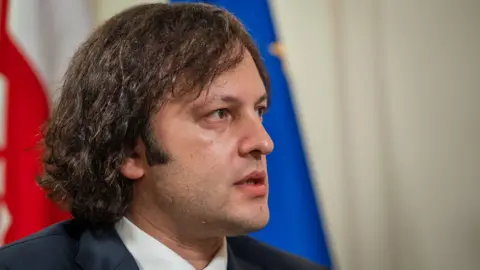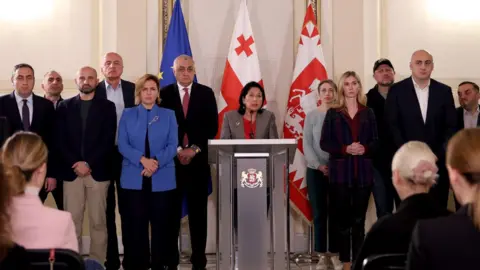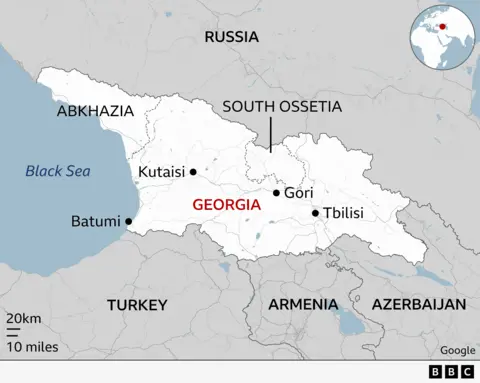[ad_1]
 Matthew Goddard/BBC
Matthew Goddard/BBCGeorgia’s prime minister has hailed a “landslide” election result, rejecting allegations of vote-rigging and violence.
“Irregularities happen everywhere,” Irakli Kobakhidze of the Georgian Dream party told the BBC’s Steve Rosenberg in an exclusive interview.
Official preliminary results from Georgia’s election commission gave the ruling Georgian Dream an outright majority of 54%, despite exit polls for opposition TV channels suggesting four opposition parties had won.
Georgia’s pro-Western president, Salome Zourabichvili, has condemned the “total falsification” of the vote and called for opposition supporters to rally outside parliament on Monday.
Election observers have suggested that the number of vote violations may have affected the result. However, the prime minister insisted that out of 3,111 polling stations, there had been incidents in “just a couple of precincts”.
Georgian Dream has become increasingly authoritarian, passing Russian-style laws targeting media and non-government groups who receive foreign funding and the LGBT community. The European Union has responded by freezing Georgia’s bid to join the EU, accusing it of “democratic backsliding”.
However, one EU leader, Hungary’s Viktor Orban, has been especially quick to congratulate the party on its fourth term and is due to travel to Georgia on Monday.
Georgian Dream says it is keen to kickstart talks on reviving its EU bid, but the sight of Orban arriving in Tbilisi two days after a contested election is unlikely to go down well in Brussels.
 Georgian presidency
Georgian presidencyIn an initial statement on Sunday night, the head of the European Council of EU leaders, Charles Michel, said “alleged irregularities must be seriously clarified and addressed” and called for a swift, transparent and independent investigation.
“Of course we have to address these irregularities happening on the day of the election or before,” the Georgian prime minister told the BBC. “But the general content of the elections was in line with legal principles and the principle of democratic elections.”
The four opposition groups have refused to recognise the election result, condemning it as falsified, and they have accused the ruling Georgian Dream party of stealing the vote.
They will now hold 61 seats in the 150-seat parliament, while Georgian Dream will have 89 – a majority but not big enough to enact the kind of constitutional change it wanted, to carry out its threat to ban opposition parties.
Two of the four opposition groups, Coalition for Change and United National Movement, have said they will boycott parliament.
Surrounded by leaders of the opposition, Georgia’s president said the vote could not be recognised and accused Russia of interfering in the election.
In his BBC interview, Kobakhidze accused the opposition of lying, arguing that they had also said the vote had been falsified in 2016, 2020 and 2021.
“Of course they have now no other way, so they have to tell their supporters that either they were lying or the government rigged the elections.”
An electronic vote-counting system was used for the first time on Saturday, and the prime minister said that made the election impossible to rig: “There is zero space for manipulation.”

The chairman of Georgia’s election commission who oversaw the new system hailed the vote as largely peaceful and free, but a very different picture has emerged from monitoring groups that have presented their initial findings.
Georgia’s Isfed group reported a litany of violations, including bribery, intimidation and ballot-stuffing, and said the result “cannot be seen as truly reflecting the preferences of Georgian voters”.
Per Eklund, a former EU ambassador who was part of the National Democratic Institute delegation, said it was clear the pre-election period in particular had failed to meet democratic standards.
“Voter intimidation… up to and on election day severely undermined the process,” he said.
Kobakhidze also used his BBC interview to deny the opposition’s accusation that the government was pro-Russian and “pro-Putinist”. He said they had been trying to damage the government’s reputation with Georgia’s 3.7 million population, which is overwhelmingly pro-European.
Russian commentators have widely welcomed Georgian Dream’s victory as an indication that Georgia will begin to pivot back to Moscow.
However, the prime minister said that Georgia was the only country in its region with no diplomatic relations with Russia, because of Russia’s occupation of 20% of Georgian territory since the five-day war in 2008.
[ad_2]

